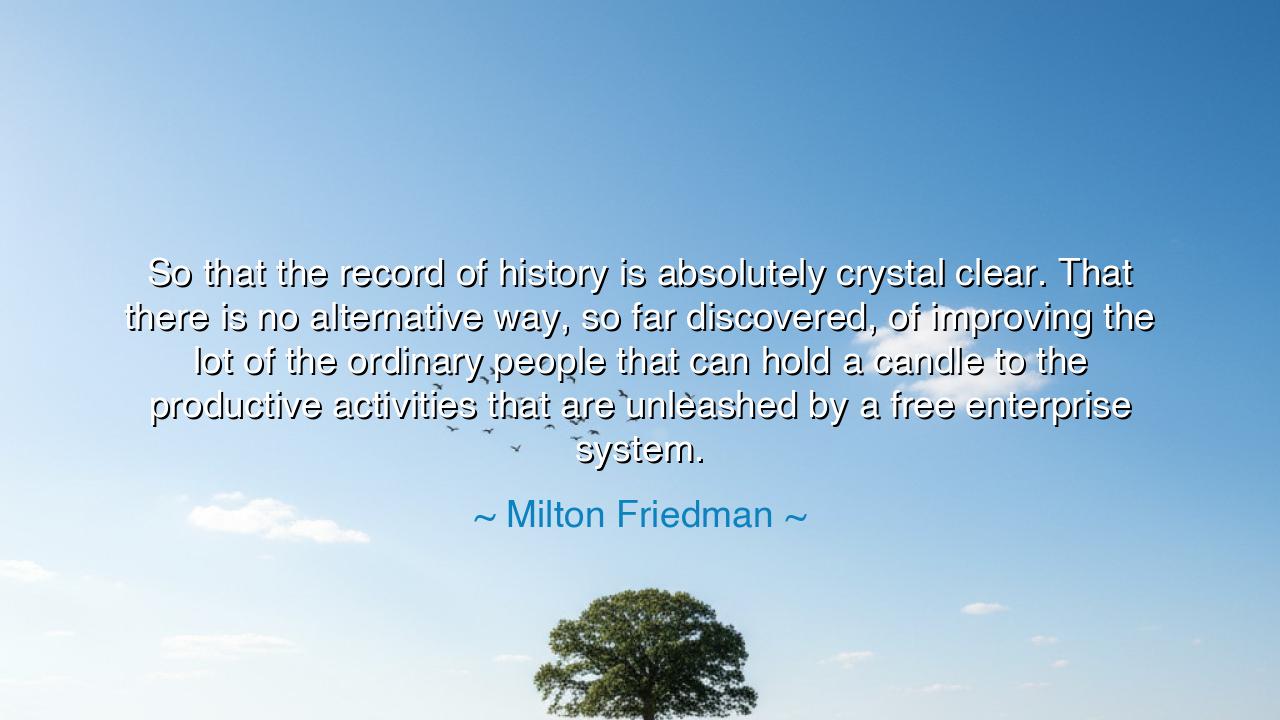
So that the record of history is absolutely crystal clear. That
So that the record of history is absolutely crystal clear. That there is no alternative way, so far discovered, of improving the lot of the ordinary people that can hold a candle to the productive activities that are unleashed by a free enterprise system.






“So that the record of history is absolutely crystal clear. That there is no alternative way, so far discovered, of improving the lot of the ordinary people that can hold a candle to the productive activities that are unleashed by a free enterprise system.” Thus declared Milton Friedman, the philosopher of economic liberty, whose words rang like a bell in an age of confusion. In this statement, he does not merely defend a system of trade or commerce — he affirms a principle of human energy, a belief in the creative fire that burns within the hearts of free men and women. His voice, like that of the prophets of old, seeks to make the record of history “crystal clear” — that the prosperity and dignity of the common person are born not from compulsion, but from freedom.
In the ancient world, freedom was the breath of civilization. The Greeks built their temples not under the whip, but under the inspiration of open thought. The merchants of Phoenicia spread their sails across the seas not by decree, but by the desire to create, to trade, to discover. In every age, where freedom flourished, abundance followed. Friedman, who lived through the great storms of the 20th century — depression, war, and tyranny — had seen what happens when men seek to rule the market by force. He saw how the spirit of enterprise dies when bound by the iron chains of control, and how only liberty could rekindle the power of invention and labor.
His words were born from witness. The world had watched the grand experiments of planned economies — the Soviet Union, Maoist China, and others — where men claimed they could engineer prosperity from above. Yet what arose was stagnation, scarcity, and silence. Factories stood still, shelves were bare, and the “ordinary people” — those whom the revolution had promised to uplift — remained trapped in poverty. Meanwhile, in the lands where markets were free, the miracle of productivity transformed existence: light filled the homes of the poor, medicine conquered disease, machines multiplied human effort, and education spread like dawn. Friedman looked upon this contrast and spoke, not with arrogance, but with the calm certainty of one who had seen truth proven by history.
“There is no alternative way...” he said — not as a boast, but as a warning. For mankind has always been tempted to believe that benevolence can replace liberty, that order can replace spontaneity, that control can yield creation. Yet again and again, the story repeats: where freedom is taken, innovation dies. The farmer grows what he is told, not what the soil demands. The craftsman obeys, but does not dream. The people live, but they do not thrive. It is the freedom to imagine, to risk, to fail and rise again that gives life its wealth — not merely of money, but of purpose and progress.
Consider the story of South Korea after the war — a nation in ashes, split and desolate. To the north, under the rule of command, there was control without prosperity; to the south, under enterprise, there was freedom without certainty. Yet within a single generation, the south blossomed. From hunger and ruin emerged the miracles of industry, art, and innovation — a living testament to Friedman’s creed. The difference was not in resources or destiny, but in the freedom of enterprise — the unleashed will of ordinary people to strive, to build, to prosper.
In the ancients’ language, freedom was not mere license; it was order born of virtue — a harmony between the laws of man and the laws of nature. So it is with the market. The free enterprise system is not chaos; it is the natural rhythm of human endeavor when guided by respect, trust, and exchange. It does not demand that all be equal in wealth, but that all be equal in opportunity — to work, to trade, to dream. It is not perfect, but it is alive. And in its imperfection lies its strength: it grows, it learns, it renews.
So, my friend, heed this lesson of history: that freedom is not only the right to speak or to think, but the right to create — to shape one’s destiny through effort and imagination. The prosperity of nations is not built by rulers, but by millions of hands working freely toward their hopes. Cherish that freedom, for once lost, it is not easily regained. Defend the right to produce, to innovate, to exchange — for in that right lies the light of human progress.
And remember, as Friedman said, when the record of history is laid bare, it will be seen with unclouded truth: that freedom, not compulsion, has been the mother of invention; that enterprise, not authority, has lifted the poor; and that the greatest power ever unleashed upon the earth is not government or gold — but the creative spirit of the free human being.






AAdministratorAdministrator
Welcome, honored guests. Please leave a comment, we will respond soon